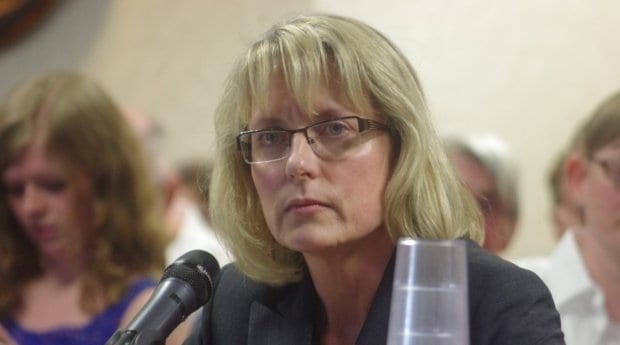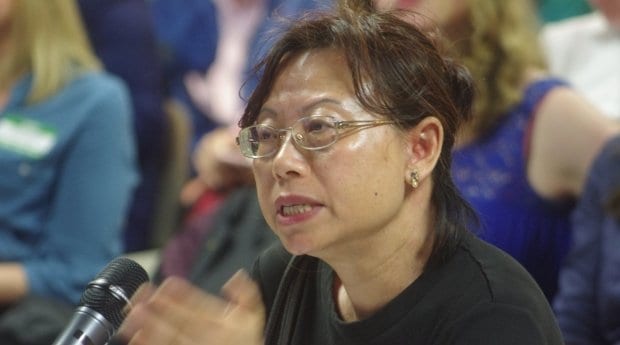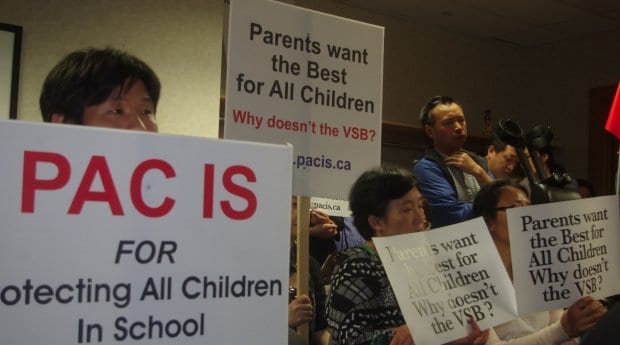
“Bullying? You want to know about bullying? Try being a Christian in this town, try being a Conservative in this town,” said opponent Cheryl Chang, spokesperson for Protecting All Children in School. Credit: Nathaniel Christopher

Opponent Hesther Chan says she's worried about children who may later regret their decision to transition but have already taken hormone blockers. Credit: Nathaniel Christopher
Hundreds of supporters and opponents packed a Vancouver School Board meeting May 14 to discuss the board’s plan to update its anti-homophobia policy to make schools more welcoming to transgender students.
The new policy addresses areas such as washroom and change-room accessibility, proper use of pronouns, access to physical education and sports, as well as a commitment by schools to reduce or eliminate sex-segregated activities.
The board is expected to vote on the policy next month.
Vancouver Technical Secondary student Roan Reimer spoke in favour of the policy, saying it will better support LGBT students and families in the district. “I can tell you about how I spent months using only the washroom in the basement in my school where no one ever goes,” Reimer (who uses the gender-neutral pronoun “they”) told the meeting. “About how I would sneak in it so nobody would see, just so I wouldn’t get yelled at for using the ‘wrong’ washroom.
“I can tell you how hard it is to do anything, let alone study and pass your classes, when you are consumed with the hatred that people pour on to you. I can tell you how kids try to take their own lives or cut into their skin because of the hatred that surrounds them.”
Many of the policy update’s opponents are part of a group called Protecting All Children in School (PACIS), which believes the proposed changes are flawed and being rushed in without proper consultation.
Cheryl Chang, who spoke on behalf of PACIS, decried the consultation process and asked that the policy conversation be slowed down so that “proper” consultation could take place with parents and health professionals. Chang also urged the board not to vote on the proposed policy changes without prior approval from the BC College of Physicians and Surgeons and the BC College of Psychologists.
“In my view, you should cancel all further public meetings until this goes back to the staff to talk to the professional organizations that should be involved in approving this policy,” Chang said. “What this is doing is setting up a war, and I call tell you in my petition it says we care for all people, regardless of race, religion, sexual orientation or gender identity.”
Chang claims that she has faced accusations of homophobia as a result of that petition.
“I don’t hate those people. I care for those people, and yet rumours are being spread around, and by the way, I have served my PAC [parent advisory council] for four years — two as chair — and now the whole Grade 12 class is upset because they are saying that I’m homophobic. How do you think that affects my child? Bullying? You want to know about bullying? Try being a Christian in this town; try being a Conservative in this town.”
Chang said she supports the school board’s existing anti-homophobia policy, which was implemented in 2004.
Several opponents of the policy voiced their support for Chang. Some, who said they were more comfortable speaking in Cantonese, attempted to allot their five-minute speaking time back to Chang to give her extra time to speak on their behalf.
Many opponents also cheered Charter Lau, who was a key player in the opposition to the Burnaby school board’s anti-homophobia policy in 2011. Lau, a Burnaby resident who says he spends more time in Vancouver, said parents need to have more say on this policy.
“We don’t have to rush it, in my opinion,” he said. “Your challenge is to make a good policy that appeals to both sides so that every child, both trans and non-trans, will be protected and be welcomed in the school.”
Hesther Chan expressed concern for children who may later regret their transition.
“I’m a very concerned parent. I believe this transgender issue requires extensive research and consultation, and there are many side effects of the hormonal blockers and [it] will be extremely damaging to a child’s physical and emotional health if he or she takes hormonal blockers for a long time,” she said. “It will be very traumatic for the child as the development of the sexual organs has already been greatly interfered with by hormonal therapy, and I believe we should leave this to medical professionals.”
Karen Chan said the policy attempts to regulate feelings and expressions of attitude instead of behaviours. She takes issue with the board’s proposed commitment to implement a measure that will “define appropriate expectations, language, behaviours and actions in order to prevent discrimination and harassment” and “ensure that homophobic and transphobic complaints are taken seriously and dealt with expeditiously and effectively through consistently applied policy and procedures.”
“When I look at the glossary of what homophobia and transphobia means,” she said, “it means an expression of fear. Fear is an emotion, and it’s not healthy to suppress a child’s emotion, and we should allow the child to express that emotion and we should not punish them or discipline them because of that emotion.”
Andrea Szewchuk, a family physician with four years’ experience working with gender-diverse and trans communities, said the 2004 policy no longer meets the needs of today’s youth.
“These youth we are discussing are highly vulnerable,” said Szewchuk, who identifies as gender non-binary. “A national study in 2010, long after the last VSB policy was put into place, showed that nearly 80 percent of trans kids felt unsafe in their own schools, and when half of them went for help it was not to be found. So it’s very clear that current policy is not doing enough to support our kids.”
Fiona Chen, a proud mother of a gender-nonconforming child, said the policy would better protect her child and other gender-nonconforming students.
She spoke about her child’s struggle with coming out in Grade 5 and praised the support provided by VSB teachers and administrators. “And I tell you, [during] this process she was depressed and had a lot of anxiety, and six months later, through the help from the school and with the help of the school principal and teachers and supportive classmate, he’s much happier and more confident at school. It’s a day-and-night difference, I will tell you. So that’s why I’m here to support this proposed policy. This policy is not coming out of nowhere. It’s the result of the needs of these students.”

 Why you can trust Xtra
Why you can trust Xtra


